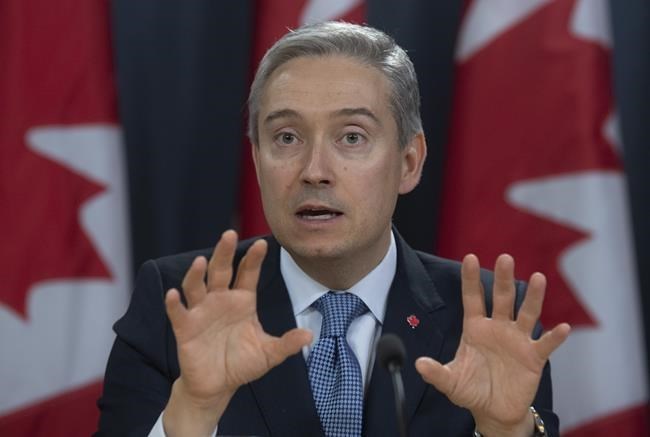OTTAWA — Canada and its NATO allies wrestled Thursday with responding to the COVID-19 crisis while reining in potential new Russian mayhem-making and helping war-torn Iraq and Afghanistan.
The discussion unfolded via secure video links — a first in the alliance's seven decades — among the alliance's foreign ministers, including Canada's Francois-Philippe Champagne, as well as NATO's political and military chiefs.
They discussed the need to combat "disinformation" as well as providing support to various partners, including the World Health Organization, the United Nations and the European Union, the alliance said in a post-meeting statement.
Canada is leading NATO's military training mission in Iraq and has troops in Latvia as part of the deterrence efforts against Russia, which breached Europe's border by annexing part of Ukraine in 2014. Thursday's meeting was also looking at ways to further support the non-NATO countries of Ukraine and Georgia, the alliance said.
A senior Canadian official, speaking on the condition of anonymity because of the sensitivity of the discussions, said despite the COVID-19 pandemic, Canada's priority is for the alliance to keep its eyes on the challenges already on its plate before the outbreak.
"The COVID-19 pandemic is a test for all of us and highlights the crucial role NATO continues to play," Champagne said in a statement.
The competing challenges were reflected in the declaration NATO released following the morning talks, which were to include Secretary-General Jens Stoltenberg and NATO's Supreme Allied Commander Europe, Gen. Tod D. Wolters.
"Even as we do the absolute maximum to contain and then overcome this challenge, NATO remains active, focused and ready to perform its core tasks: collective defence, crisis management, and co-operative security," the communique said.
David Perry, a defence analyst, said NATO faces some of its own health challenges, among them the fact that the USS Theodore Roosevelt aircraft carrier is out of commission because of a virus outbreak, while Poland's army chief tested positive last month.
"How much of the alliance is actually fighting fit is changing pretty fast, negatively," said Perry, a Canadian Global Affairs Institute vice-president. "It's improbable other ships or assets aren't already impacted."
The NATO communique said the alliance is airlifting medical supplies around the world, providing people and goods and "vital equipment from military and civilian sources, and harnessing our medical, scientific, and technological knowledge" to deal with the pandemic.
"Allies are also working together to ensure public access to transparent, timely, and accurate information, which is critical to overcoming this pandemic and to combating disinformation," it said.
The statement made no direct mention of Russia, but it affirmed that the alliance's "ability to conduct our operations and assure deterrence and defence against all the threats we face is unimpaired."
A day earlier, Stoltenberg said in Brussels that the alliance had made the necessary adjustments to address Russian military manoeuvres close to NATO's borders. Russian planes have flown close to Canadian and American airspace in the Arctic recently, for instance.
Karlis Eihenbaums, Latvia's ambassador to Canada, said the pandemic has done nothing to stop the "wars and tensions" NATO was already dealing with.
"We can even see that there are some who are using this challenging time to play their cynicism in full and to use this pandemic for their spreading of propaganda and disinformation. In essence, they are playing with people's lives because disinformation can kill," said Eihenbaums.
"We are still receiving report after report of a war going on in Europe, as attacks against Ukraine never stopped."
Andriy Shevchenko, Ukraine's ambassador to Canada, said offers by Russia to send medics and supplies to Italy mask a malevolent intent.
He said that amounts to "humanitarian wars, or humanitarian special operations" on Russia's part. The Kremlin has denounced criticism that it is using the crisis for political gain.
"Russia has the experience of lying on an industrial scale, and also interfering into other nations' lives with their information tools," said Shevchenko.
"It's something we know so well from our Ukrainian experience, and it's something that Canadians should be concerned about as well."
Thursday's meeting also looked at stepping up the NATO training mission in Iraq and strengthening the alliance's partnerships in the Middle East, North Africa and Afghanistan, the alliance said in a statement today.
The meeting was the first for the alliance's newest member, North Macedonia, which joined last Friday, expanding NATO's ranks to 30 countries.
This report by The Canadian Press was first published April 2, 2020.
Mike Blanchfield, The Canadian Press



